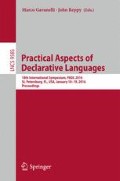Abstract
The knowledge base paradigm aims to express domain knowledge in a rich formal language, and to use this domain knowledge as a knowledge base to solve various problems and tasks that arise in the domain by applying multiple forms of inference. As such, the paradigm applies a strict separation of concerns between information and problem solving. In this paper, we analyze the principles and feasibility of the knowledge base paradigm in the context of an important class of applications: interactive configuration problems. In interactive configuration problems, a configuration of interrelated objects under constraints is searched, where the system assists the user in reaching an intended configuration. It is widely recognized in industry that good software solutions for these problems are very difficult to develop. We investigate such problems from the perspective of the KB paradigm. We show that multiple functionalities in this domain can be achieved by applying different forms of logical inferences on a formal specification of the configuration domain. We report on a proof of concept of this approach in a real-life application with a banking company.
Access this chapter
Tax calculation will be finalised at checkout
Purchases are for personal use only
Notes
- 1.
In the rest of this paper, a domain atom is treated as a term that evaluates to true or false.
- 2.
We note that \(\le _p\) is a partial order and denote \(min_{\le _p}\) for all minimal elements of a set according to that order.
- 3.
More info about this implementation, a downloadable demo and another example of a configuration system developed with IDP as an engine (a simpler course configuration demo) can be found at: http://www.configuration.tk.
References
Adaptive planet. http://www.adaptiveplanet.com/
Andersen, H.R., Hadzic, T., Pisinger, D.: Interactive cost configuration over decision diagrams. J. Artif. Intell. Res. (JAIR) 37, 99–139 (2010)
Axling, T., Haridi, S.: A tool for developing interactive configuration. J. Logic Program. 19, 658–679 (1994)
Bogaerts, B., Jansen, J., Bruynooghe, M., De Cat, B., Vennekens, J., Denecker, M.: Simulating dynamic systems using linear time calculus theories. TPLP 14(4–5), 477–492 (2014)
Dasseville, I., van der Hallen, M., Janssens, G., Denecker, M.: Semantics of templates in a compositional framework for building logics (2015). abs/1507.06778
De Cat, B., Bogaerts, B., Bruynooghe, M., Denecker, M.: Predicate logic as a modelling language: The IDP system. In: CoRR (2014). abs/1401.6312
Denecker, M., Ternovska, E.: A logic of nonmonotone inductive definitions. ACM Trans. Comput. Log. 9(2), 14:1–14:52 (2008)
Denecker, M., Vennekens, J.: Building a knowledge base system for an integration of logic programming and classical logic. In: Garcia de la Banda, M., Pontelli, E. (eds.) ICLP 2008. LNCS, vol. 5366, pp. 71–76. Springer, Heidelberg (2008)
Hadzic, T.: A BDD-based approach to interactive configuration. In: Wallace, M. (ed.) CP 2004. LNCS, vol. 3258, p. 797. Springer, Heidelberg (2004)
Hadzic, T., Andersen, H.R.: Interactive reconfiguration in power supply restoration. In: van Beek, P. (ed.) CP 2005. LNCS, vol. 3709, pp. 767–771. Springer, Heidelberg (2005)
Immerman, N., Vardi, M.Y.: Model checking and transitive-closure logic. In: Grumberg, O. (ed.) CAV 1997. LNCS, vol. 1254. Springer, Heidelberg (1997)
Kleene, S.C.: Introduction to Metamathematics. Van Nostrand, New York (1952)
Mitchell, D.G., Ternovska, E., Hach, F., Mohebali, R.: Model expansion as a framework for modelling and solving search problems. Technical report TR 2006–24, Simon Fraser University, Canada (2006)
Pelov, N., Denecker, M., Bruynooghe, M.: Well-founded and stable semantics of logic programs with aggregates. TPLP 7(3), 301–353 (2007)
Pontelli, E., Son, T.C.: Justifications for logic programs under answer set semantics. In: Etalle, S., Truszczyński, M. (eds.) ICLP 2006. LNCS, vol. 4079, pp. 196–210. Springer, Heidelberg (2006)
Qml. http://qmlbook.org/
Schneeweiss, D., Hofstedt, P.: FdConfig: a constraint-based interactive product configurator. In: Tompits, H., Abreu, S., Oetsch, J., Pührer, J., Seipel, D., Umeda, M., Wolf, A. (eds.) INAP/WLP 2011. LNCS, vol. 7773, pp. 230–246. Springer, Heidelberg (2013)
Shlyakhter, I., Seater, R., Jackson, D., Sridharan, M., Taghdiri, M.: Debugging overconstrained declarative models using unsatisfiable cores. In: ASE, pp. 94–105. IEEE Computer Society (2003)
Subbarayan, S., Jensen, R.M., Hadzic, T., Andersen, H.R., Hulgaard, H., Møller, J.: Comparing two implementations of a complete and backtrack-free interactive configurator. In: Proceedings of Workshop on CSP Techniques with Immediate Application, CP 2004 (2004)
Syrjänen, T.: Debugging inconsistent answer set programs. In: Dix, J., Hunter, A. (eds.) NMR, pp. 77–84. Institut für Informatik, Technische Universität Clausthal, Clausthal-Zellerfeld (2006)
Tiihonen, J., Heiskala, M., Anderson, A., Soininen, T.: Wecotin - a practical logic-based sales configurator. AI Commun. 26(1), 99–131 (2013)
Bossche, M.V., Ross, P., MacLarty, I., Van Nuffelen, B., Pelov, N.: Ontology driven software engineering for real life applications. In: 3rd International Workshop on Semantic Web Enabled Software Engineering (SWESE) (2007)
Vlaeminck, H., Vennekens, J., Denecker, M.: A logical framework for configuration software. In: Porto, A., López-Fraguas, F.J. (eds.) PPDP, pp. 141–148. ACM (2009)
Wittocx, J., Mariën, M., Denecker, M.: The idp system: a model expansion system for an extension of classical logic. In: Denecker, M. (ed.) LaSh, pp. 153–165. ACCO, Leuven (2008)
Wittocx, J., Vlaeminck, H., Denecker, M.: Debugging for model expansion. In: Hill, P.M., Warren, D.S. (eds.) ICLP 2009. LNCS, vol. 5649, pp. 296–311. Springer, Heidelberg (2009)
Author information
Authors and Affiliations
Corresponding author
Editor information
Editors and Affiliations
Rights and permissions
Copyright information
© 2016 Springer International Publishing Switzerland
About this paper
Cite this paper
Pieter, V.H., Dasseville, I., Janssens, G., Denecker, M. (2016). The KB Paradigm and Its Application to Interactive Configuration. In: Gavanelli, M., Reppy, J. (eds) Practical Aspects of Declarative Languages. PADL 2016. Lecture Notes in Computer Science(), vol 9585. Springer, Cham. https://doi.org/10.1007/978-3-319-28228-2_2
Download citation
DOI: https://doi.org/10.1007/978-3-319-28228-2_2
Published:
Publisher Name: Springer, Cham
Print ISBN: 978-3-319-28227-5
Online ISBN: 978-3-319-28228-2
eBook Packages: Computer ScienceComputer Science (R0)

